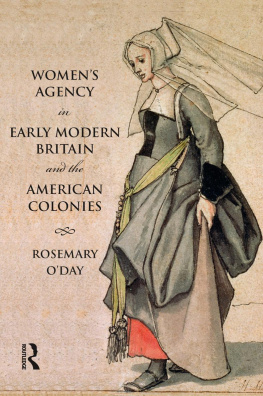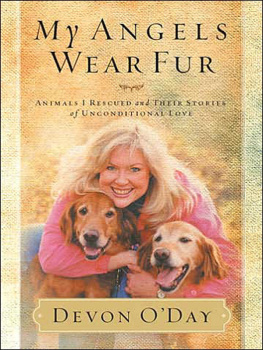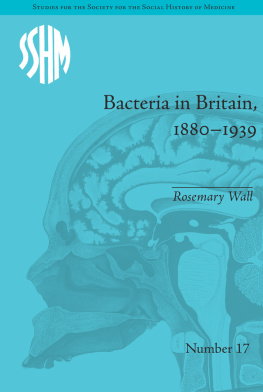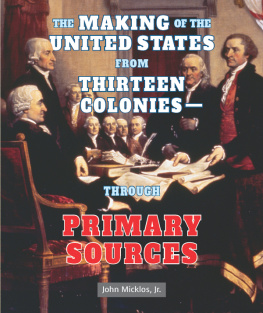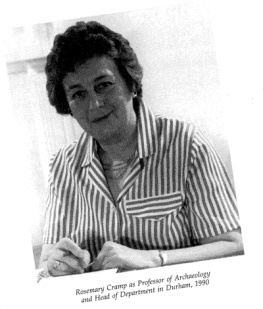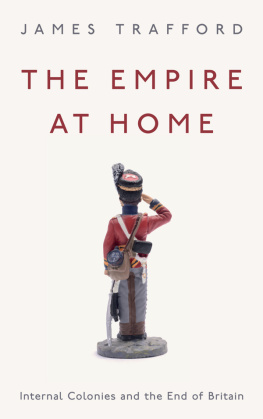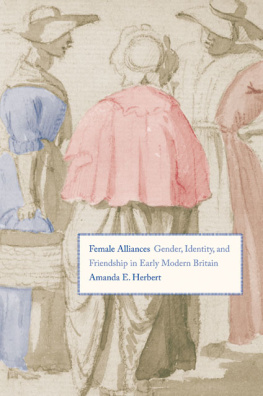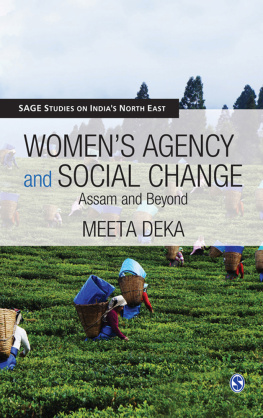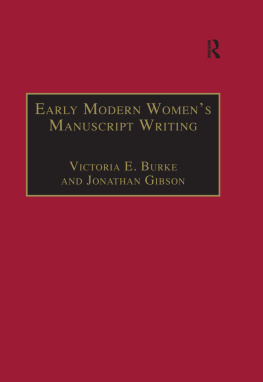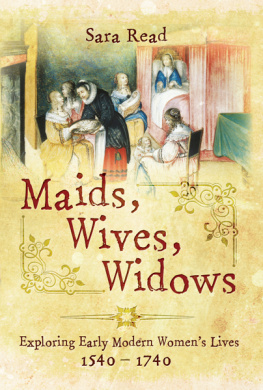Womens Agency in Early Modern Britain and the American Colonies
THEMES IN BRITISH SOCIAL HISTORY
edited by John Stevenson
This series covers the most important aspects of British social history from the Renaissance to the present day. Topics include education, poverty, health, religion, leisure, crime and popular protest, some of which are treated in more than one volume. The books are written for undergraduates, postgraduates and the general reader, and each volume combines a general approach to the subject with the primary research of the author.
Currently available
THE ENGLISH FAMILY, 14501700
Ralph A. Houlbrooke
POVERTY AND POLICY IN TUDOR AND STUART ENGLAND
Paul Slack
CRIME IN EARLY MODERN ENGLAND, 15501750
J. A. Sharpe
GENDER IN ENGLISH SOCIETY, 16501850: The Emergence of Separate Spheres?
Robert Shoemaker
LITERATURE AND SOCIETY IN EIGHTEENTH-CENTURY ENGLAND
W. A. Speck
CRIME AND SOCIETY IN ENGLAND, 17501900 (Third Edition)
Clive Emsley
THE LABOURING CLASSES IN EARLY INDUSTRIAL ENGLAND, 17501850
John Rule
POPULAR DISTURBANCES IN ENGLAND, 17001832 (Second Edition)
John Stevenson
SEX, POLITICS AND SOCIETY: The Regulation of Sexuality since 1800 (Second Edition)
Jeffrey Weeks
HEALTH AND SOCIETY IN TWENTIETH-CENTURY BRITAIN
Helen Jones
NEWSPAPERS AND ENGLISH SOCIETY, 16951855
Hannah Barker
THE PROFESSIONS IN EARLY MODERN ENGLAND, 14501800
Rosemary ODay
POPULAR CULTURES IN ENGLAND, 15501750
Barry Reay
THE ENGLISH TOWN, 16801840
Rosemary Sweet
Womens Agency in Early Modern Britain and the American Colonies
Patriarchy, partnership and patronage
Rosemary ODay
First published 2007 by Pearson Education Limited
Published 2014 by Routledge
2 Park Square, Milton Park, Abingdon, Oxon OX14 4RN
711 Third Avenue, New York, NY 10017, USA
Routledge is an imprint of the Taylor & Francis Group, an informa business
Copyright 2007, Taylor & Francis.
The right of Rosemary ODay to be identified as author of this work has been asserted by her in accordance with the Copyright, Designs and Patents Act 1988.
All rights reserved. No part of this book may be reprinted or reproduced or utilised in any form or by any electronic, mechanical, or other means, now known or hereafter invented, including photocopying and recording, or in any information storage or retrieval system, without permission in writing from the publishers.
Notices
Knowledge and best practice in this field are constantly changing. As new research and experience broaden our understanding, changes in research methods, professional practices, or medical treatment may become necessary.
Practitioners and researchers must always rely on their own experience and knowledge in evaluating and using any information, methods, compounds, or experiments described herein. In using such information or methods they should be mindful of their own safety and the safety of others, including parties for whom they have a professional responsibility.
To the fullest extent of the law, neither the Publisher nor the authors, contributors, or editors, assume any liability for any injury and/or damage to persons or property as a matter of products liability, negligence or otherwise, or from any use or operation of any methods, products, instructions, or ideas contained in the material herein.
ISBN 13: 978-0-582-29463-9 (pbk)
British Library Cataloguing in Publication Data
A CIP catalogue record for this book can be obtained from the British Library
Set by 35 in 10/13.5pt Sabon
Contents
Preface
I was commissioned to write this book shortly before my husband (and soulmate) David Englander died. In their infinite wisdom administrators at the Open University suggested that I become acting and then actual head of department in order to overcome my grief. Partly as a result, this book has taken a decade to complete. I hope, however, that the long gestation period has produced a better book than I had at first envisaged. When he was dying, David advised me to find happiness where I could and especially in a return to early modern studies. He was right, and I did.
I owe so many debts of gratitude. First of all, I wish to thank the authors of the books, articles and theses that I have read. I have listed in the bibliography all works from which I quoted or drew significantly. Secondly, I thank the archivists and assistants, past and present, who have helped me at the various record offices: British Library, Bodleian Library, Lichfield Joint Record Office, William Salt Library and Staffordshire County Record Office, North London Collegiate School, Nottingham University Library, Shakespeare Birthplace Trust Record Office, Folger Shakespeare Library, Washington DC; Library of Congress, Huntington Library, San Marino, California. I must single out for special mention Dr Mary Robertson of the Huntington who has given generously of her time and expertise regarding the Egerton, Temple and Brydges families and their papers; Karen Morgan of the North London Collegiate School, for her immense cooperation; Mairi Macdonald of the Shakespeare Birthplace Trust for her generosity and Dorothy Johnston of the University of Nottingham Library for her interest and assistance. Thirdly, I thank especially Ian Harris, Barbara Donagan, Patrick Collinson, Dorothy Johnston, Anne Laurence, Gill Perry and the Gender in the Humanities Group at the Open University for their conversation, comments and support. I am particularly grateful to the Huntington Library for allowing me to work there for an extended period each year and to its fellowship committee for awarding me an Andrew Mellon fellowship in 2005/6. Financial support was also extended by The Open University, for which I am most grateful. I acknowledge the above libraries and record offices for quotation from documents in their possession. I gratefully acknowledge the Church Commissioners, North London Collegiate School and Stoneleigh Abbey Limited for other permissions.
I owe a great debt to Dr John Stevenson, editor of this series, for his enthusiastic support and helpful suggestions and to Dr Rachel Gibbons, my research assistant, for her bibliographical work and her generous comments. In addition I thank Christina Wipf Perry of Longman/Pearson for her help and patience.
Last but not least, I thank my family Andrew ODay and Dan and Matthew Englander and my good friends Janet Dawson, Catherine Roe, Sheila Taylor, Meg Kesten, Yvonne Alton, Lee Stolzman and Sian Lewis for support when I was brought low by lifes vicissitudes, and for listening patiently when I was eventually revived by this book.
Rosemary ODay
The Open University, June 2006
I dedicate this book to my parents and siblings, with thanks for their unfailing support and love:
My mother Beryl Robinson Brookes (19021989)
My father Thomas Henry Brookes (18951980)
My sister
Kathleen Mary Brookes Poole (1929)
My brothers
Bryan John Brookes (1931)
Neville Hugh Brookes (1936)
BL | British Library |
CSPD | Calendar of State Papers Domestic |
FSL | Folger Shakespeare Library, Washington, DC |
HEH |


